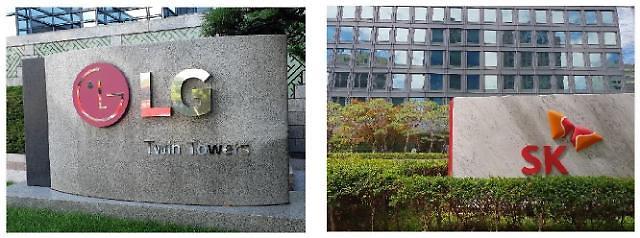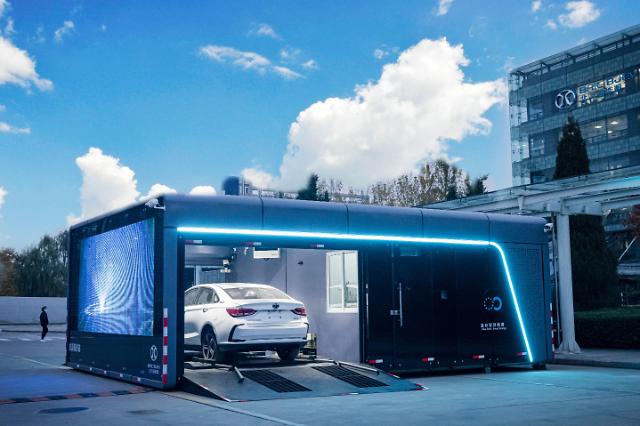
[Aju News DB]
SEOUL -- SK Innovation, the battery-making wing of South Korea's SK Group, blasted LG Energy Solution for harboring ulterior intentions to oust its domestic rival from the U.S. market and establish its exclusive position through lawsuits. The new broadside came after their European client, Volkswagen, unveiled an eventual switch to a new type of battery for electric vehicles.
SK Innovation (SKI) has been locked in a prolonged legal battle with LG Energy Solution (LGES), a unit of South Korea's LG Group, over intellectual property rights. The U.S. International Trade Commission favored LG in February and issued a 10-year import ban on some of SKI's battery products. In response, SKI lobbied the White House to overturn the decision, insisting it could jeopardize a $2.6 billion plant under construction in Georgia.
On March 12, LGES unveiled a new investment of more than five trillion won ($4.42 billion) by 2025 to secure an independent production capacity of more than 70gigawatt hours (GWh) in the U.S. alone. The company has a 5GWh plant in Michigan with its 35GWh joint venture plant with General Motors under construction in Ohio. A separate investment will be decided by the end of June to build a second joint venture plant.
LGES said its pre-emptive investment is aimed at establishing a stable supply chain system in the U.S. and In response to President Joe Biden's Green New Deal initiative that would bring big changes to electric vehicle and ESS markets, the company promised to make further investments by 2030 and establish various types of supply chains with customers.
SKI played down LGES' new investment that followed unsuccessful negotiations on the amount of compensation as a plot to deter Biden from exercising his veto, saying it revealed the purpose of lawsuits "overtly" to oust SKI from the U.S. market and establish its exclusive position.
Both LG and SK groups nurture their battery-making businesses as their next cash cow through a steady injection of capital for pre-emptive facility investment and technical development. Their legal fight has affected the nerves of South Korean policymakers who want a concerted push among domestic companies to join forces against foreign rivals especially in China.
SKI's accusations came after Volkswagen unveiled a massive push to reduce the cost of producing batteries and eventually switch to solid-state technology. There are three types of batteries - prismatic, pouch and cylindrical. LGES and SKI have supplied pouch-type batteries for Volkswagen, while China's Contemporary Amperex Technology (CATL) and Samsung SDI have supplied prismatic ones.
Cylindrical cells have high specific energy and good mechanical stability, but they are commonly used for portable applications. Prismatic cells are encased in aluminum or steel for stability and satisfy the demand for thinner sizes. Wrapped in packages, prismatic cells make optimal use of space and allow flexible design but they can be more expensive to manufacture and have a shorter cycle life than cylindrical design.
Pouch cells use laminated architecture in a bag, offering a simple, flexible and lightweight solution to battery design. They are light and cost-effective but exposure to humidity and high temperature can shorten life. Swelling is a concern.
Samsung SDI has introduced a process that stacks internal materials on a square. The stacked type square battery can utilize 100 percent of the internal space. Shrinkage and swelling occur only vertically during charging and discharging. Less material deformation occurs even after a long time of use. Samsung researchers have developed a prototype pouch cell for high-performance, long-lasting "all-solid-state" batteries that would enable an electric vehicle to travel up to 800 kilometers (497 miles) on a single charge.
Lithium-ion batteries have the weakness of taking too long to charge and discharge. Battery suppliers are trying to develop cheaper, more efficient, more powerful batteries. Demand for medium and large batteries is increasing not only in electric vehicles but also in various fields such as boats, electric trucks and energy storage devices.
A solid-state battery uses solid electrodes and a solid electrolyte. Compared to flammable liquid electrolytes, solid-state batteries have a lower risk of catching fire. Samsung researchers used a silver-carbon (Ag-C) composite layer to reduce thickness and increase energy density.
Copyright ⓒ Aju Press All rights reserved.




View more comments